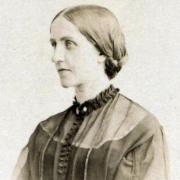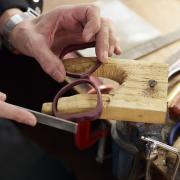It's 50 years since the Life Peerages Act first allowed women to sit in the House of Lords. To celebrate the anniversary, Katie Jarvis spoke to Gloucestershire's own peer, Baroness Rennie Fritchie
"We must do what we conceive to be the right thing and not bother our heads or burden our souls with whether we will be successful. Because if we don't do the right thing, we will be doing the wrong thing and we will just be a part of the disease and not a part of the cure." EF Schumacher quote, hanging on Baroness Rennie Fritchie's office wall.
"I've come to see..."
The nattily-dressed man behind the reception desk in the buzzing Central Lobby of the Houses of Parliament shakes his head. "I'm sorry - I can't phone anyone at the moment," he says, in a voice that brooks no argument. "We're waiting for the Speaker's Procession."
Indeed, there are great twitterings of anticipation from the public packed together in this octagonal ornate space. The Central Lobby is the crossroads of the Houses of Parliament. If you haven't been there in person, you've probably seen it on TV as a backdrop to Andrew Marr or Nick Robinson.
Suddenly, as if by magic, the crowds of awed tourists part like the Red Sea. Only the statues of elder statesmen remain aloof to the traditional rite they've seen so many times before.
The cry "Hats Off Strangers" bounces off the walls. The procession has arrived... Walking in tight ceremonial formation - to a respectful and somewhat bemused hush - appears the Serjeant at Arms, carrying the Mace and accompanied by a doorkeeper. The Speaker, Michael Martin, is making his way to the Chamber for the Commons to begin.
If the past is a foreign country, then the Palace of Westminster is a different universe. Who knows when customs such as these originated...
But here's the irony: I'm here to interview a woman peer who took her place in Parliament precisely because she's spent her life challenging age-old traditions; who won her spurs through her work knocking the stuffiness out of industry; who berated 'Tony's Cronies' and, instead, dedicated herself to creating an egalitarian society based on merit, not birth or friendship.
Rennie Fritchie? In the House of Lords?
"Actually," she says, with a smile, "this is truly a place of diversity."
Diversity? Really?
"Diversity." Lady Fritchie emphasises. "I have found this to be a very egalitarian place. There are many, many women and many people from very diverse backgrounds. Someone I have immense respect for is Lord Victor Adebowale, the chief executive of Turning Point, the charity for homelessness, drug misuse and alcoholism. He's a very tall, very black Lord with Rasta hair and a Yorkshire accent - he breaks just about every stereotype and he's fantastic."
It's something to bear in mind as we make our way along a maze of passages. In these first few minutes, there's not much to challenge preconceptions. It's an overawing place; male in its d�cor; steeped from floor to ceiling in tradition. Baron Lawson of Blaby (better known as Nigel) wanders past; we spot Lord Carlisle and Lord Falconer ("He has Scotland the Brave as his ringtone.").
And then there's Baroness Fritchie herself. Perfectly groomed, with a sweeping black cloak that looks every inch Lordly attire, she seems like a natural inhabitant of this idiosyncratic place.
She shakes her head.
"Not at all - I'm a most unlikely person to end up here. I was talking to Elizabeth Butler-Sloss (the former senior judge) recently. We were saying, 'In your school, would you have been highlighted as the person most likely to...?' And I remembered Miss Mortimer at Ribston Hall girls' school, who thought I would come to a bad end because I spoke back and asked questions!"
Yet this former 'lippy' pupil has gone onto great things. Throughout a long career specialising in training and development, Lady Fritchie has taken a particular interest in helping women progress through the ranks. In the 1970s, she was one of the first full-time women's training advisers and pioneered the training of staff in the then-new Equal Opportunities Commission. In 1999, she became Commissioner for Public Appointments and, during her years in the post, she took on the Labour Government for making politically-motivated appointments to health authorities and NHS trusts. She's been awarded honorary degrees by various universities and, in 2005, she was made a life peer as Baroness Fritchie of Gloucester. She chose as her coat of arms Gloucester cows rampant, with a border of bluebells from the Forest of Dean, primroses from the Stroud Valleys, and the wild daffodil from Dymock and Newent, the Gloucestershire flower.It's not only Miss Mortimer who, were she still around, might be surprised. For how many of her fellow peers know that Lady Fritchie was once a struggling single mum, bringing up two children in housing association property, desperately saving to buy a house of her own?
That in itself is a tribute to how egalitarian the House of Lords has become.
*********
There are seminal moments in everyone's life. Rennie Fritchie has a particularly telling one. As a young, single mum in the early '70s, desperately trying to earn a decent wage, she was thrilled to win a promotion which meant she qualified for a company mortgage subsidy. When she approached her boss, he practically laughed in her face. Don't be silly - those sorts of perks were for men, not women! "He said to me, 'If we give it to you, we'll be giving it to secretaries next!'
"I fought for a year until, finally, the chief executive called me in. They'd had a meeting and decided they would give it to me - but they added in a rule that it was to be for the prime earner in the family at this level. Of course, because I was a single parent, I would get it."
So did she collapse, overcome with undying gratitude?
"I said, 'Well thank you very much. Can I assume it will be backdated to the date of my promotion?' And he just said, 'Get out! Get out!'"
She laughs at the memory. "I used to say that the problem with getting more women to senior levels is the emotion that will be around the board-room table. And the men would nod and say, 'You're absolutely right', and I'd say, "Yes, because men get very emotional when there are women around. And it's true!"
Rennie Fritchie has spent her life challenging convention, working in her own logical, persistent way. Yet there's not a shrill or aggressive bone in her body. This isn't a woman masquerading as a man. Instead, sitting at a table in the Royal Court of the House of Lords, she exhibits a wisdom gained over a lifetime of experience. Some would say some fairly difficult experiences. As a single working mother, she's had her guilt trips over missed assemblies and sports days. She's had to count every penny and juggle commitments. Her elder son, Eric, was killed in a hit-and-run before he was 30. "But there are no violins in the background for me," she insists. "When the children were young, I lived a hardworking life with no certainties or guarantees, but it wasn't sad."
It's been a fascinating life so far - that's for sure. And far from conventional, either. For this is one member of the House of Lords who left school at 15 (when a car accident cut short her academic career); who married at 18 (to an American working at GCHQ) and became a mother before she was 20.
"I know what it's like to live with a small amount of money; I know how important it is to have a post office just down the road," she says.
In a sense, it's always been a life of extremes. One of five children, she was born in bleak post-war Scotland and lived there until the age of nine, when her father - who was in the air force - was posted to Southern Rhodesia (now Zimbabwe) for two-and-a-half years. Rennie loved the colours and freedoms of this new land; but this unusually perceptive child insisted on asking questions the grown-ups couldn't answer. Particularly about equality. Why did black people live in small houses at the bottom of white people's gardens? It was a question that resurfaced in more vivid form after her marriage, when her husband's posting took them to Maryland at the time of the Washington Riots.
"Stokely Carmichael (the activist who popularised the phrase 'Black Power') came to speak in Laurel, Maryland, the town where we were living, and riots broke out," she recalls. "Across the hall in the apartment building, there was another family who were black. When the rioters went by, we'd peer out of the window. If they were black, she'd step in front of the curtains so they would see her; and if they were white, then I would.
"I certainly learned things during those times. When you can't reason with people because they have lost all rational qualities, it's very frightening."
When their younger son was five, the couple parted, and Rennie moved back to Gloucestershire to be near her parents, faced with the prospect of bringing up two children alone. She found her first job with an insurance company, before moving to the Food Training Board, which had relocated out of London to Gloucester. It was during this period that she stumbled across a book by Carl Rogers. Entitled Freedom to Learn, it encapsulated what she was starting to work out for herself: that education isn't just about school; it's about learning from experience. For a young woman with no qualifications, this was nothing short of an epiphany.
"I felt like Dorothy in the Wizard of Oz, stepping out from black and white to colour. I thought: I can achieve things! And I began to look at many of my life experiences where whatever had happened wasn't a natural outcome - I'd been able to influence it to make things happen. And I thought, Well, I know how to do this."
When the Equal Pay Act came into being in 1976, Rennie volunteered to look into the legislation and its implications for women. There was general relief among the rest of the company (mainly men or single women) that someone would take this Cinderella subject off their hands. As a result, she wrote a paper for the board (not realising you should wait to be invited to do this sort of thing), suggesting they appoint a full-time training adviser for women's development. Without knowing it, she'd written her own job description. Her work training and supporting women in management took off from there.
Mind you, she's never been of the burn-your-bra brigade, nor the Germaine Greer school of 'castrated women'. "I wanted women to have an equality of opportunity. I never fought for women to become men," she says. "People talk about the Battle of the Sexes. How dreadful is that! I don't want to be for women and against men. I want to be for everybody."
It's a fact that, over the last 40 years, the world of work has changed beyond measure. Thanks to the unstinting efforts of people such as Rennie Fritchie, not only do women now have careers at all levels, but access to childcare has improved; flexible working and better maternity rights have also dramatically altered women's ability to access opportunities.
But Lady Fritchie is also the first to admit that there's a way to go. The old adage 'Be careful what you wish for' has never been more true. In the 21st century, women are in the top jobs - but the payback seems to be tiredness, lack of interest and depression for so many of them. What has gone so wrong? "First of all, society wouldn't let women in the door to certain jobs; and then it said you had to prove yourself. So what women did was work harder and longer and show more commitment than anybody else had to to get the job.
"What we didn't do as a society was to say: How do we change work and society so that it's a human place for us all to live in? We have one hand clapping here. Therefore, we have women stressed out because they are expected to do everything at work and everything at home. And, according to the papers, all be size 8, beautiful and smile a lot. And, if they don't, then go and be botoxed. This is just too much and mad, mad."
So what's the way forward? Well, for one thing, it's evident she feels that - to use a relevant analogy - we have thrown away the baby with the bathwater.
"I'm often asked to speak to women in banking or law, and what I see is that they're waiting until much later before they make choices about having a partner and a family. And that makes it so much harder because they have more to lose: I've got to here and I've now got to step out of it - how will I ever get back?"
"Women nowadays haven't had the experience of being around lots of brothers and sisters and helping to bring them up in the way that my generation did. Therefore, for them, having a baby is a huge big thing. They're used to being able to persuade colleagues to do certain things, but they suddenly discover you can't persuade a baby not to cry or to eat. I find that tremendous women disproportionately have the stuffing knocked out of them. 'Something's the matter with me because I can't be this perfect mother and look amazing and work full time.' Whereas they are amazing!
"We used to run courses for women returning to work or into management and we don't do that now."
Is it because we fear being patronising?
"No," she says, "I think we simply don't notice. Working mothers appear to be so confident. But when they choose to have a family, they don't have enough of the coping mechanisms that people like me developed. When I was growing up, people said the most appalling things about women, and therefore you learned not to take it all personally; not to collapse in a heap; not to be destroyed by it or depressed. My generation had a common language where we might roll our eyes and say to each other, 'Oh, men!'"
But if she has one sure message, it's one that has guided her own life: The ability to change the world lies within each and every one of us - male or female.
"I remember having an epiphany moment when I was no more than nine," she says. "I heard someone talking about why something wasn't their fault - it was because of their parents. And I began to think - well, clearly it doesn't stop there. Their mum would be like that because her parents were like that, and I went all the way back to Adam and Eve.
"Finally, I figured out that, in the end, it's down to you, isn't it? That was freeing because then you couldn't ever be trapped by circumstance. The important point is: even if you can't change the situation you're in, you can change how you feel about it."
And that is wisdom indeed.
"We must do what we conceive to be the right thing and not bother our heads or burden our souls with whether we will be successful. Because if we don't do the right thing, we will be doing the wrong thing and we will just be a part of the disease and not a part of the cure." EF Schumacher quote, hanging on Baroness Rennie Fritchie's office wall.
"I've come to see..."
The nattily-dressed man behind the reception desk in the buzzing Central Lobby of the Houses of Parliament shakes his head. "I'm sorry - I can't phone anyone at the moment," he says, in a voice that brooks no argument. "We're waiting for the Speaker's Procession."
Indeed, there are great twitterings of anticipation from the public packed together in this octagonal ornate space. The Central Lobby is the crossroads of the Houses of Parliament. If you haven't been there in person, you've probably seen it on TV as a backdrop to Andrew Marr or Nick Robinson.
Suddenly, as if by magic, the crowds of awed tourists part like the Red Sea. Only the statues of elder statesmen remain aloof to the traditional rite they've seen so many times before.
The cry "Hats Off Strangers" bounces off the walls. The procession has arrived... Walking in tight ceremonial formation - to a respectful and somewhat bemused hush - appears the Serjeant at Arms, carrying the Mace and accompanied by a doorkeeper. The Speaker, Michael Martin, is making his way to the Chamber for the Commons to begin.
If the past is a foreign country, then the Palace of Westminster is a different universe. Who knows when customs such as these originated...
But here's the irony: I'm here to interview a woman peer who took her place in Parliament precisely because she's spent her life challenging age-old traditions; who won her spurs through her work knocking the stuffiness out of industry; who berated 'Tony's Cronies' and, instead, dedicated herself to creating an egalitarian society based on merit, not birth or friendship.
Rennie Fritchie? In the House of Lords?
"Actually," she says, with a smile, "this is truly a place of diversity."
Diversity? Really?
"Diversity." Lady Fritchie emphasises. "I have found this to be a very egalitarian place. There are many, many women and many people from very diverse backgrounds. Someone I have immense respect for is Lord Victor Adebowale, the chief executive of Turning Point, the charity for homelessness, drug misuse and alcoholism. He's a very tall, very black Lord with Rasta hair and a Yorkshire accent - he breaks just about every stereotype and he's fantastic."
It's something to bear in mind as we make our way along a maze of passages. In these first few minutes, there's not much to challenge preconceptions. It's an overawing place; male in its d�cor; steeped from floor to ceiling in tradition. Baron Lawson of Blaby (better known as Nigel) wanders past; we spot Lord Carlisle and Lord Falconer ("He has Scotland the Brave as his ringtone.").
And then there's Baroness Fritchie herself. Perfectly groomed, with a sweeping black cloak that looks every inch Lordly attire, she seems like a natural inhabitant of this idiosyncratic place.
She shakes her head.
"Not at all - I'm a most unlikely person to end up here. I was talking to Elizabeth Butler-Sloss (the former senior judge) recently. We were saying, 'In your school, would you have been highlighted as the person most likely to...?' And I remembered Miss Mortimer at Ribston Hall girls' school, who thought I would come to a bad end because I spoke back and asked questions!"
Yet this former 'lippy' pupil has gone onto great things. Throughout a long career specialising in training and development, Lady Fritchie has taken a particular interest in helping women progress through the ranks. In the 1970s, she was one of the first full-time women's training advisers and pioneered the training of staff in the then-new Equal Opportunities Commission. In 1999, she became Commissioner for Public Appointments and, during her years in the post, she took on the Labour Government for making politically-motivated appointments to health authorities and NHS trusts. She's been awarded honorary degrees by various universities and, in 2005, she was made a life peer as Baroness Fritchie of Gloucester. She chose as her coat of arms Gloucester cows rampant, with a border of bluebells from the Forest of Dean, primroses from the Stroud Valleys, and the wild daffodil from Dymock and Newent, the Gloucestershire flower.It's not only Miss Mortimer who, were she still around, might be surprised. For how many of her fellow peers know that Lady Fritchie was once a struggling single mum, bringing up two children in housing association property, desperately saving to buy a house of her own?
That in itself is a tribute to how egalitarian the House of Lords has become.
*********
There are seminal moments in everyone's life. Rennie Fritchie has a particularly telling one. As a young, single mum in the early '70s, desperately trying to earn a decent wage, she was thrilled to win a promotion which meant she qualified for a company mortgage subsidy. When she approached her boss, he practically laughed in her face. Don't be silly - those sorts of perks were for men, not women! "He said to me, 'If we give it to you, we'll be giving it to secretaries next!'
"I fought for a year until, finally, the chief executive called me in. They'd had a meeting and decided they would give it to me - but they added in a rule that it was to be for the prime earner in the family at this level. Of course, because I was a single parent, I would get it."
So did she collapse, overcome with undying gratitude?
"I said, 'Well thank you very much. Can I assume it will be backdated to the date of my promotion?' And he just said, 'Get out! Get out!'"
She laughs at the memory. "I used to say that the problem with getting more women to senior levels is the emotion that will be around the board-room table. And the men would nod and say, 'You're absolutely right', and I'd say, "Yes, because men get very emotional when there are women around. And it's true!"
Rennie Fritchie has spent her life challenging convention, working in her own logical, persistent way. Yet there's not a shrill or aggressive bone in her body. This isn't a woman masquerading as a man. Instead, sitting at a table in the Royal Court of the House of Lords, she exhibits a wisdom gained over a lifetime of experience. Some would say some fairly difficult experiences. As a single working mother, she's had her guilt trips over missed assemblies and sports days. She's had to count every penny and juggle commitments. Her elder son, Eric, was killed in a hit-and-run before he was 30. "But there are no violins in the background for me," she insists. "When the children were young, I lived a hardworking life with no certainties or guarantees, but it wasn't sad."
It's been a fascinating life so far - that's for sure. And far from conventional, either. For this is one member of the House of Lords who left school at 15 (when a car accident cut short her academic career); who married at 18 (to an American working at GCHQ) and became a mother before she was 20.
"I know what it's like to live with a small amount of money; I know how important it is to have a post office just down the road," she says.
In a sense, it's always been a life of extremes. One of five children, she was born in bleak post-war Scotland and lived there until the age of nine, when her father - who was in the air force - was posted to Southern Rhodesia (now Zimbabwe) for two-and-a-half years. Rennie loved the colours and freedoms of this new land; but this unusually perceptive child insisted on asking questions the grown-ups couldn't answer. Particularly about equality. Why did black people live in small houses at the bottom of white people's gardens? It was a question that resurfaced in more vivid form after her marriage, when her husband's posting took them to Maryland at the time of the Washington Riots.
"Stokely Carmichael (the activist who popularised the phrase 'Black Power') came to speak in Laurel, Maryland, the town where we were living, and riots broke out," she recalls. "Across the hall in the apartment building, there was another family who were black. When the rioters went by, we'd peer out of the window. If they were black, she'd step in front of the curtains so they would see her; and if they were white, then I would.
"I certainly learned things during those times. When you can't reason with people because they have lost all rational qualities, it's very frightening."
When their younger son was five, the couple parted, and Rennie moved back to Gloucestershire to be near her parents, faced with the prospect of bringing up two children alone. She found her first job with an insurance company, before moving to the Food Training Board, which had relocated out of London to Gloucester. It was during this period that she stumbled across a book by Carl Rogers. Entitled Freedom to Learn, it encapsulated what she was starting to work out for herself: that education isn't just about school; it's about learning from experience. For a young woman with no qualifications, this was nothing short of an epiphany.
"I felt like Dorothy in the Wizard of Oz, stepping out from black and white to colour. I thought: I can achieve things! And I began to look at many of my life experiences where whatever had happened wasn't a natural outcome - I'd been able to influence it to make things happen. And I thought, Well, I know how to do this."
When the Equal Pay Act came into being in 1976, Rennie volunteered to look into the legislation and its implications for women. There was general relief among the rest of the company (mainly men or single women) that someone would take this Cinderella subject off their hands. As a result, she wrote a paper for the board (not realising you should wait to be invited to do this sort of thing), suggesting they appoint a full-time training adviser for women's development. Without knowing it, she'd written her own job description. Her work training and supporting women in management took off from there.
Mind you, she's never been of the burn-your-bra brigade, nor the Germaine Greer school of 'castrated women'. "I wanted women to have an equality of opportunity. I never fought for women to become men," she says. "People talk about the Battle of the Sexes. How dreadful is that! I don't want to be for women and against men. I want to be for everybody."
It's a fact that, over the last 40 years, the world of work has changed beyond measure. Thanks to the unstinting efforts of people such as Rennie Fritchie, not only do women now have careers at all levels, but access to childcare has improved; flexible working and better maternity rights have also dramatically altered women's ability to access opportunities.
But Lady Fritchie is also the first to admit that there's a way to go. The old adage 'Be careful what you wish for' has never been more true. In the 21st century, women are in the top jobs - but the payback seems to be tiredness, lack of interest and depression for so many of them. What has gone so wrong? "First of all, society wouldn't let women in the door to certain jobs; and then it said you had to prove yourself. So what women did was work harder and longer and show more commitment than anybody else had to to get the job.
"What we didn't do as a society was to say: How do we change work and society so that it's a human place for us all to live in? We have one hand clapping here. Therefore, we have women stressed out because they are expected to do everything at work and everything at home. And, according to the papers, all be size 8, beautiful and smile a lot. And, if they don't, then go and be botoxed. This is just too much and mad, mad."
So what's the way forward? Well, for one thing, it's evident she feels that - to use a relevant analogy - we have thrown away the baby with the bathwater.
"I'm often asked to speak to women in banking or law, and what I see is that they're waiting until much later before they make choices about having a partner and a family. And that makes it so much harder because they have more to lose: I've got to here and I've now got to step out of it - how will I ever get back?"
"Women nowadays haven't had the experience of being around lots of brothers and sisters and helping to bring them up in the way that my generation did. Therefore, for them, having a baby is a huge big thing. They're used to being able to persuade colleagues to do certain things, but they suddenly discover you can't persuade a baby not to cry or to eat. I find that tremendous women disproportionately have the stuffing knocked out of them. 'Something's the matter with me because I can't be this perfect mother and look amazing and work full time.' Whereas they are amazing!
"We used to run courses for women returning to work or into management and we don't do that now."
Is it because we fear being patronising?
"No," she says, "I think we simply don't notice. Working mothers appear to be so confident. But when they choose to have a family, they don't have enough of the coping mechanisms that people like me developed. When I was growing up, people said the most appalling things about women, and therefore you learned not to take it all personally; not to collapse in a heap; not to be destroyed by it or depressed. My generation had a common language where we might roll our eyes and say to each other, 'Oh, men!'"
But if she has one sure message, it's one that has guided her own life: The ability to change the world lies within each and every one of us - male or female.
"I remember having an epiphany moment when I was no more than nine," she says. "I heard someone talking about why something wasn't their fault - it was because of their parents. And I began to think - well, clearly it doesn't stop there. Their mum would be like that because her parents were like that, and I went all the way back to Adam and Eve.
"Finally, I figured out that, in the end, it's down to you, isn't it? That was freeing because then you couldn't ever be trapped by circumstance. The important point is: even if you can't change the situation you're in, you can change how you feel about it."
And that is wisdom indeed.


























